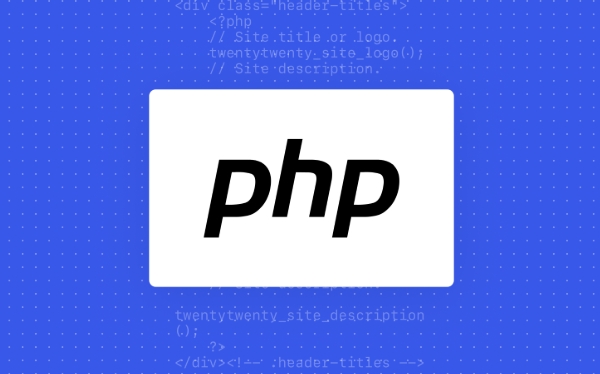PHP Constants vs. Variables: A Guide to Immutability
Jul 25, 2025 pm 05:37 PMConstants cannot be changed after definition, while variables can; 1. Variables start with $, are mutable, scoped, and ideal for dynamic data; 2. Constants use define() or const, have no $, are immutable, globally scoped, and best for fixed values like configuration; 3. Use constants for unchanging values to improve readability, prevent errors, and centralize settings, but use variables when flexibility is needed; 4. const is for compile-time declarations in classes or global scope, while define() allows runtime or conditional definitions; 5. Avoid case-insensitive constants and using const in conditionals, as it causes parse errors, whereas define() is allowed; choosing the right one enhances code clarity, maintainability, and performance.

When working with PHP, understanding the difference between constants and variables is essential—especially when it comes to immutability. While both store data, their behavior, scope, and use cases differ significantly. Let’s break down the key differences and when to use each.

What Are Variables in PHP?
Variables in PHP are mutable containers for storing data. They can be changed at any point during script execution.
$name = "John"; echo $name; // Output: John $name = "Jane"; echo $name; // Output: Jane
Key traits of variables:

- Start with a
$symbol (e.g.,$name) - Can be reassigned
- Scoped (local, global, static)
- Created on first assignment
- Case-sensitive
Variables are ideal when you need flexibility—like storing user input, loop counters, or temporary data.
What Are Constants in PHP?
Constants are immutable values that, once defined, cannot be changed or undefined during the script’s execution.

You define them using the define() function or the const keyword.
define("SITE_NAME", "MyWebsite");
echo SITE_NAME; // Output: MyWebsite
// Or using const (within a class or global space in PHP 7 )
const MAX_LOGIN_ATTEMPTS = 3;
echo MAX_LOGIN_ATTEMPTS; // Output: 3Key traits of constants:
- No
$prefix - Cannot be changed after definition
- Default scope is global (always accessible)
- Case-sensitive by default (though
define()allows case-insensitive option) - Must be assigned a value at declaration (can't be expressions in older PHP versions, but now allowed in
constwith compile-time values)
Key Differences: Constants vs. Variables
| Feature | Variables | Constants |
|---|---|---|
| Mutability | Mutable (can change) | Immutable (cannot change) |
| Declaration syntax | $var = value; | define('NAME', value); or const NAME = value; |
| Scope | Local/global depending on use | Always global |
| Prefix | $ required | No $ |
| Reassignment | Allowed | Not allowed |
| Performance | Slight overhead | Slightly faster (cached by engine) |
When to Use Constants
Constants are best for values that should not change and are used throughout your application. Examples:
- Configuration settings
- Application-wide settings
- Mathematical or algorithmic fixed values
- API keys (though better stored externally)
define("DB_HOST", "localhost");
define("PI", 3.14159);
const APP_ENV = "production";Using constants here makes your code:
- More readable
- Less error-prone (no accidental reassignment)
- Easier to maintain (centralized values)
Important Notes and Best Practices
Use
constfor class/interface/trait constants, and for compile-time constants in global space.Use
define()for runtime definitions or when you need conditional definition.if (!defined('ENV')) { define('ENV', 'development'); }Avoid case-insensitive constants (third argument in
define()), as they can cause confusion:define('GREETING', 'Hello', true); // $greeting, $GREETING, $Greeting all workConstants cannot be used for storing resources or objects (in most cases).
constmust be used at the top level or inside a class; it cannot be used in conditional blocks:if (true) { const VALUE = 10; // Parse error! }But
define()works here:if (true) { define('VALUE', 10); // OK }
Summary
- Variables = flexible, changeable, scoped.
- Constants = fixed, global, performant, and safer for unchanging values.
Use constants when you want to enforce immutability and share configuration or fixed values across your app. Use variables when you need dynamic behavior.
Choosing the right one improves code clarity, prevents bugs, and makes your PHP applications more maintainable.
Basically: if it shouldn’t change, make it a constant.
The above is the detailed content of PHP Constants vs. Variables: A Guide to Immutability. For more information, please follow other related articles on the PHP Chinese website!

Hot AI Tools

Undress AI Tool
Undress images for free

Undresser.AI Undress
AI-powered app for creating realistic nude photos

AI Clothes Remover
Online AI tool for removing clothes from photos.

Clothoff.io
AI clothes remover

Video Face Swap
Swap faces in any video effortlessly with our completely free AI face swap tool!

Hot Article

Hot Tools

Notepad++7.3.1
Easy-to-use and free code editor

SublimeText3 Chinese version
Chinese version, very easy to use

Zend Studio 13.0.1
Powerful PHP integrated development environment

Dreamweaver CS6
Visual web development tools

SublimeText3 Mac version
God-level code editing software (SublimeText3)
 Passing Variables by Reference vs. By Value in Functions
Jul 26, 2025 am 09:49 AM
Passing Variables by Reference vs. By Value in Functions
Jul 26, 2025 am 09:49 AM
Passbyvaluemeansacopyofthedataispassed,sochangesinsidethefunctiondonotaffecttheoriginalvariable,asseeninCwithprimitivesorPythonwithimmutabletypes.2.Passbyreferencemeansthefunctionreceivesadirectreferencetotheoriginal,somodificationsinsidethefunctiona
 The Lifecycle of a PHP Variable: From Allocation to Garbage Collection
Jul 24, 2025 pm 10:49 PM
The Lifecycle of a PHP Variable: From Allocation to Garbage Collection
Jul 24, 2025 pm 10:49 PM
APHPvariable'slifecyclebeginswithmemoryallocationviazvalcreation,whichstoresthevalue,type,referencecount,andreferenceflag.2.Whenvariablesareassignedorshared,PHPusesreferencecountingandcopy-on-writetooptimizememoryusage,onlyduplicatingdatawhennecessar
 The Case Against the `global` Keyword: Strategies for Cleaner Code
Jul 25, 2025 am 11:36 AM
The Case Against the `global` Keyword: Strategies for Cleaner Code
Jul 25, 2025 am 11:36 AM
Avoidusingtheglobalkeywordunnecessarilyasitleadstocodethatishardertotest,debug,andmaintain;instead,usefunctionparametersandreturnvaluestopassdataexplicitly.2.Replaceglobalvariableswithpurefunctionsthatdependonlyontheirinputsandproduceoutputswithoutsi
 Modernizing Your Classes with PHP Typed Properties
Jul 26, 2025 am 09:49 AM
Modernizing Your Classes with PHP Typed Properties
Jul 26, 2025 am 09:49 AM
TypedpropertiesinPHP7.4 allowdirecttypedeclarationforclassproperties,improvingreliability,IDEsupport,andcodeclarity;2.Theyenforcetypesafety,reducebugs,enablebetterautocompletion,andminimizeconstructorchecks;3.Tomigrate,useexisting@vardocblockstoaddty
 Demystifying PHP's Variable Variables (`$$var`)
Jul 25, 2025 am 04:42 AM
Demystifying PHP's Variable Variables (`$$var`)
Jul 25, 2025 am 04:42 AM
Variable variables use the value of one variable as the name of another variable through the $$var syntax; 2. For example, when $myVar is "hello", $$myVar is equivalent to $hello and can be assigned a value; 3. In practical applications, it can be used to dynamically process form data, such as traversing $_POST with foreach and creating corresponding variables with $$key; 4. There are problems such as poor readability, high security risks, and disrupting static analysis, especially avoiding the use of $$ for user input; 5. It is recommended to use arrays or objects instead of creating dynamic variables, such as storing data into $data array instead of creating dynamic variables; 6. Using ${$var} curly brace syntax can improve code clarity, especially in complex scenarios. Variable change
 A Deep Dive into PHP Superglobals: Beyond `$_GET` and `$_POST`
Jul 26, 2025 am 09:41 AM
A Deep Dive into PHP Superglobals: Beyond `$_GET` and `$_POST`
Jul 26, 2025 am 09:41 AM
PHPsuperglobalsinclude$_GET,$_POST,$_REQUEST,$_SESSION,$_COOKIE,$_SERVER,$_FILES,$_ENV,and$GLOBALS,eachservingdistinctpurposesbeyondjusthandlingformdata;theyenablestatemanagement,serverinteraction,andenvironmentaccess.1.$_REQUESTcombines$_GET,$_POST,
 PHP Constants vs. Variables: A Guide to Immutability
Jul 25, 2025 pm 05:37 PM
PHP Constants vs. Variables: A Guide to Immutability
Jul 25, 2025 pm 05:37 PM
Constantscannotbechangedafterdefinition,whilevariablescan;1.Variablesstartwith$,aremutable,scoped,andidealfordynamicdata;2.Constantsusedefine()orconst,haveno$,areimmutable,globallyscoped,andbestforfixedvalueslikeconfiguration;3.Useconstantsforunchang
 The Nuances of `isset()`, `empty()`, and `is_null()` for Variable Validation
Jul 24, 2025 pm 10:15 PM
The Nuances of `isset()`, `empty()`, and `is_null()` for Variable Validation
Jul 24, 2025 pm 10:15 PM
isset()checksifavariableisdeclaredandnotnull,returningtrueforemptystrings,0,'0',false,andemptyarrays;useittoconfirmavariableexistsandhasbeenset,suchasverifyingforminputslike$_POST['email'].2.empty()determinesifavalueis"empty"inauser-logicse






